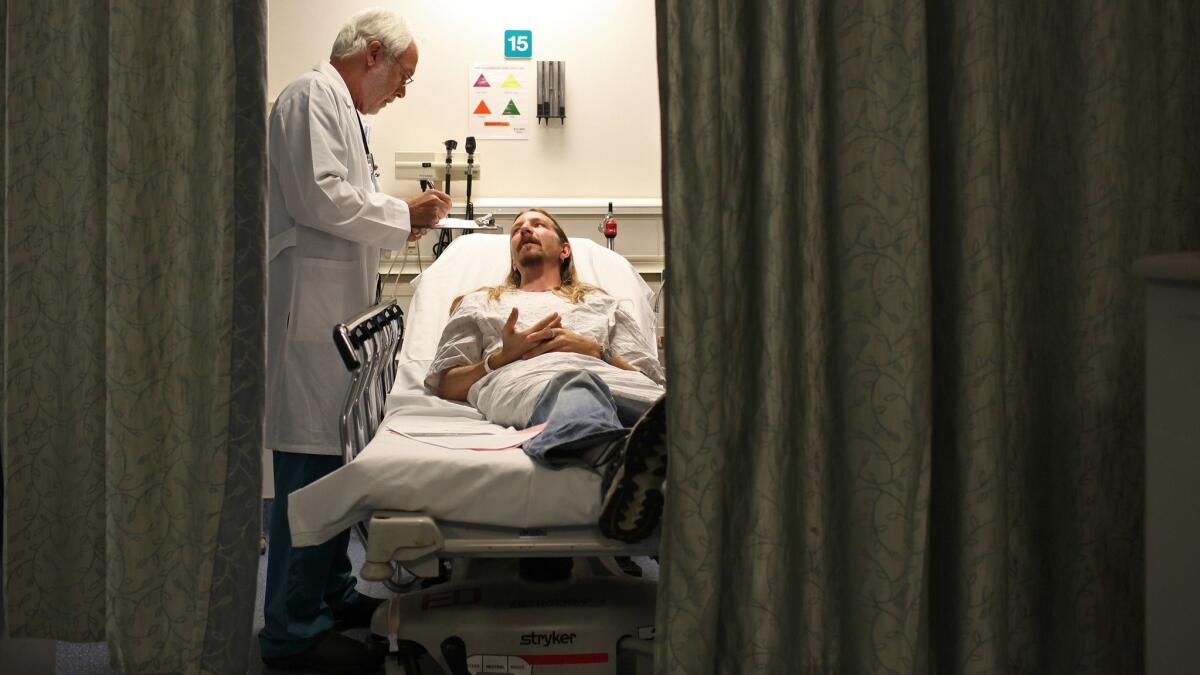Op-Ed: Can how you vote in the midterms bring down the cost of health care?

- Share via
A professional acquaintance told me she received two booklets in the mail last week. The first stated that her family’s health insurance premiums were going up $130 per month. The second was her sample ballot for the Nov. 6 election. Concerned about the first, she asked for my thoughts on the second.
If you’re equally perplexed by whether your vote can influence healthcare prices, here are some things to consider.
First, a fact: In the $3.5-trillion U.S. healthcare industry, it is estimated that one in every three dollars is wasted. The majority of that waste doesn’t come from government or insurance companies, but rather doctors and hospitals. To lower the price of health insurance premiums, we need to address a care delivery system that’s ineffectively structured, perversely compensated, technologically antiquated and poorly led.
There’s no magic pill to fix these systemic problems or flatten healthcare’s rate of inflation. Political candidates nevertheless vow to cure our healthcare woes (painlessly). The truth is, campaign promises are like babies: easy to make, hard to deliver. Democrats promising “Medicare for all” can’t deliver “free” healthcare because it’ll be too expensive and overtax the middle class. Republicans are promising affordable “short-term” insurance plans that sidestep the Affordable Care Act requirements, but these plans are thin on coverage and big on risk.
If you’re perplexed by whether your vote can influence healthcare prices, here are some things to consider.
So voters need to recognize what Congress really can and can’t do in the next two years. If the Senate remains closely divided between parties, as appears likely, Congress can’t repeal the Affordable Care Act (or “Obamacare”) because it would take 60 votes to end debate and vote to undo all ACA regulations. This means some rules, like protections for people with preexisting conditions, won’t be undone any time soon. Other aspects of Obamacare, such as budget-based provisions, can be repealed with a simple majority vote in both chambers. These include government subsidies for low-income enrollees who get insurance on Obamacare exchanges and tax credits for small businesses that contribute to employee health plans.
Any hope for containing healthcare costs in the next Congress boils down to prescription drugs. To reduce prices, Congress could shorten patent protections and loosen import regulations on biosimilar drugs. But don’t count on it. The U.S. pharmaceutical industry spends hundreds of millions each year on campaign contributions and lobbying to encourage favorable legislation. That won’t change after election day.
Finally, voters should keep in mind the bigger picture on health. Research demonstrates that “social determinants” — e.g., poverty, nutrition, community safety and childhood trauma — have a far greater influence on health than what takes place in a doctor’s office or hospital. Whichever party controls Congress will have major influence on funding for social welfare programs.
Armed with these facts, here’s what I’d want to ask any candidate for Congress about healthcare costs.
Do you accept campaign contributions from U.S. drug companies? Any politician accepting large donations from drugmakers is unlikely to support legislation to let the government negotiate lower prescription prices for Americans or allow cheaper imports.
Do you think hospitals need to perform a certain number of procedures each year to receive Medicare funding? Time and again, independent research organizations like the Leapfrog Group demonstrate that a low volume of procedures equals low quality, higher rates of medical error and higher costs. If the government slowed funding to low-volume facilities, more patients would be referred to high-volume centers of excellence and receive better outcomes. It’d be cheaper too.
Enter the Fray: First takes on the news of the minute from L.A. Times Opinion »
Since residency programs are largely taxpayer funded, would you favor a law that forces hospitals to train more primary care doctors? Compared with other nations, the United States has too many specialists and not enough primary care doctors. We need more doctors who can help patients avoid heart attacks, strokes or chronic diseases in the first place. Prevention is the best money-saver of all in health care.
Would you vote for a law that forces electronic heath record vendors to open their Application Processing Interfaces (APIs)? If you can access your bank balances and financial information at every ATM in the country, why can’t you enable access of your medical information at any medical office? Companies that sell these systems fear that open APIs would allow hospitals and doctors to easily switch to less-expensive competitors. And maybe it would. But it would also reduce medical errors, prevent duplicate testing, and speed up care delivery — all of which would lower costs.
Poll after poll shows that healthcare is a top issue in the midterm election. Nearly half of all the midterm campaign ads on TV mention healthcare. But unless voters push candidates to acknowledge healthcare’s systemic flaws and demonstrate the independence needed to upset special interests, we are assured of only two things: insurance premiums will continue to go up and more empty campaign promises will greet us in 2020.
Robert Pearl is the former chief executive of the Permanente Medical Group (Kaiser Permanente) for 18 years. He’s the author of “Mistreated: Why We Think We’re Getting Good Health Care — And Why We’re Usually Wrong” and hosts the podcast “Fixing Healthcare.”
Follow the Opinion section on Twitter @latimesopinion and Facebook
More to Read
A cure for the common opinion
Get thought-provoking perspectives with our weekly newsletter.
You may occasionally receive promotional content from the Los Angeles Times.









